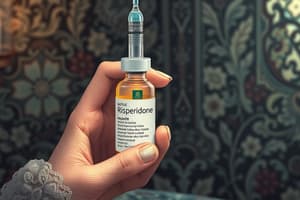Podcast
Questions and Answers
What should be the first step in verifying the right resident for medication administration?
What should be the first step in verifying the right resident for medication administration?
- Verify the resident's identity using at least two identifiers (correct)
- Check the medication label
- Ensure the right documentation is prepared
- Confirm the right medication
Why is it important to confirm the right dose before medication administration?
Why is it important to confirm the right dose before medication administration?
- To ensure the medication is administered via the correct route
- To document the details in the resident's eMAR accurately
- To ensure the medication is given at the correct time
- To prevent potential side effects from overdose or underdose (correct)
What does the right documentation involve during the medication process?
What does the right documentation involve during the medication process?
- Accurately logging administration details in the resident's eMAR (correct)
- Ensuring the medication is given at the designated times
- Recording the ingredients of the medication
- Creating a report for the practitioner's review
What is the purpose of checking the right reason for administering medication?
What is the purpose of checking the right reason for administering medication?
What is required before a resident can self-administer medication?
What is required before a resident can self-administer medication?
Who should have access to the Medication Rooms in Long-Term Care Homes?
Who should have access to the Medication Rooms in Long-Term Care Homes?
What is required when wasting narcotics in a Long-Term Care Home?
What is required when wasting narcotics in a Long-Term Care Home?
What is essential for residents who are on multiple medications?
What is essential for residents who are on multiple medications?
What precaution must be taken regarding medication carts?
What precaution must be taken regarding medication carts?
What is the role of pharmacy staff during medication reconciliation?
What is the role of pharmacy staff during medication reconciliation?
Flashcards are hidden until you start studying
Study Notes
Medication Administration Overview
- The MOLTC establishes regulations for Long-Term Care Homes concerning medication administration.
- Access to medication rooms is restricted to Registered Staff within the home area.
Medication Reconciliation and Procedures
- Pharmacy staff performs medication reconciliation upon resident admission or readmission.
- Specific medication information is accessible through the CareRX portal available at each computer station.
Medication Administration Principles
- Medication carts must be locked when unattended.
- Narcotics and controlled substances require double locking and must be visible to Registered Staff.
- Accurate documentation of medication administration is critical, as many LTC residents are on multiple medications, increasing the risk of interactions.
Medication Rights Framework
- Right Resident: Verify identity using at least two identifiers.
- Right Medication: Confirm consistency with prescriptions and eMAR.
- Right Dose: Ensure dosage is appropriate and accurate.
- Right Route: Administer medication via the prescribed route.
- Right Time: Administer medication at the correct time and frequency.
- Right Documentation: Record administration details accurately.
- Right Reason: Ensure there is a clear rationale for the medication.
- Right Response: Monitor and document resident's response and any side effects.
Self-Administration of Medications
- Residents undergo a self-administration assessment approved by a practitioner.
- Staff must create two orders on the eMAR post-approval.
Medication Incidents Reporting
- Incident reporting is mandatory using an electronic platform with progress notes in the Resident's chart.
- Types of incidents include processing, dispensing, and administration errors.
- Registered Staff must notify Pharmacists of urgent concerns.
Prevention and Review of Medication Incidents
- Regular reviews of incidents occur quarterly during SMART and PAC meetings.
- Registered Staff analyze incidents to determine causes and implement preventive measures.
Suggested Practices to Prevent Incidents
- Verify medications against the Resident’s eMAR for discrepancies.
- Sign the narcotic count card to document medication administration accurately.
- Limit distractions during medication passes to improve focus and accuracy.
New Medication Management Policy (Policy 6.687)
- The policy addresses admission/readmission, standard medication times, auditing practices, and incident reporting.
- Contains guidelines on high-alert medications, drug destruction, and medication recalls.
- Emphasizes education and procedures for Registered Staff and nursing management.
Contact for Inquiries
- Reach out to Caitlin Pogson, Chair of the SMART Committee, or any nursing Manager/Supervisor for questions.
Studying That Suits You
Use AI to generate personalized quizzes and flashcards to suit your learning preferences.



